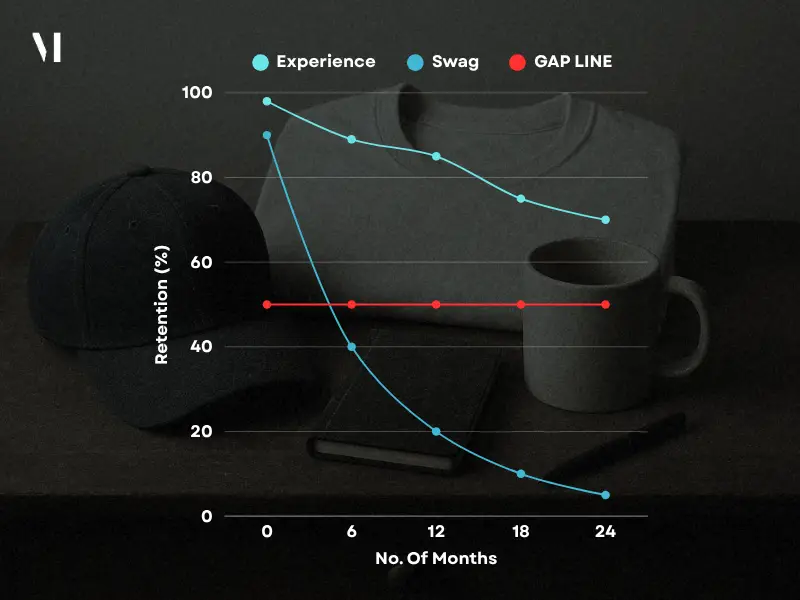Memory poverty strikes when the rewards meant to celebrate achievement vanish from consciousness within days. That expensive watch your company gave for your five-year anniversary? You check the time on your phone. The crystal award for exceeding targets? It holds down papers somewhere. These objects fail because they create no stories, spark no conversations, build no memories. They suffer from the ultimate corporate sin: forgettability.

Companies spend $90 billion annually on employee recognition in the United States alone. Yet employee engagement hovers at just 33%, unchanged for years. Here’s the disconnect: organizations invest in objects when they should invest in memories.
Think about your own life. What do you remember from five years ago? Not the things you owned but the experiences you lived. The surprise weekend trip. The concert that gave you goosebumps. The cooking class where you finally mastered pasta from scratch. These moments stick because they engage your senses, challenge your abilities, and connect you with others.
“We don’t remember days. We remember moments.”
This truth exposes why traditional rewards fail. A bonus gets absorbed into bills. A plaque gets relegated to a shelf. But that hot air balloon ride? That becomes the story you tell at dinner parties for decades.
Memory poverty isn’t just about forgetting gifts. It’s about the erosion of connection between employee and employer. When recognition fails to create lasting memories, it fails to create lasting loyalty.

Neuroscience backs this up. Experiences activate multiple brain regions simultaneously. They involve planning (prefrontal cortex), anticipation (dopamine pathways), sensory engagement (multiple cortical areas), and memory consolidation (hippocampus). Objects? They trigger a brief dopamine hit that fades within hours.
“The best reward isn’t what you give them. It’s what they remember you gave them.”
Memory formation begins before the experience itself. When employees choose their own reward through Mojo Gift, they research options, imagine possibilities, and plan logistics. This anticipation phase extends the psychological benefit of recognition from moments to weeks.
Traditional rewards offer no anticipation. They arrive, they’re acknowledged, and they’re forgotten. But when someone spends days deciding between wine tasting in Napa or whale watching in Alaska, they’re already creating memories.
Choice matters more than cost. Behavioral economists have proven that people value decisions they make themselves significantly more than those made for them. When you let employees choose from 100,000+ experiences, you’re not just giving a gift. You’re giving freedom.
“Choice transforms a corporate gesture into a personal journey.”
This explains why generic rewards fail. They reflect the giver’s assumptions, not the recipient’s desires. They say, “We think you’re a watch person” instead of asking, “What would bring you joy?”
Experiences generate narratives. Objects don’t. Nobody shares passionate stories about their employee-of-the-month plaque. But that time they went paragliding? That cooking lesson with a Michelin-starred chef? These become part of their personal mythology.
Stories also spread recognition’s impact. When one employee shares their experience, others envision their own future rewards. This viral effect multiplies engagement across teams.
Psychologists call them “peak moments”. Experiences of intense emotion that become memory landmarks. Traditional rewards rarely create peaks. They might generate mild satisfaction, but not the emotional intensity that ensures permanent encoding.
Experiences naturally create peaks. The nervousness before skydiving. The triumph of completing a marathon. These emotional highs guarantee the experience, and by extension, the recognition stays remembered.
When employee engagement suffers from memory poverty, organizations pay multiple prices:
Recruitment Costs Escalate Disengaged employees leave. Replacing them costs between 50% and 200% of their annual salary. If better recognition could improve retention by just 10%, the savings would transform bottom lines.
Productivity Plummets Engaged employees produce 23% more than their disengaged counterparts. Memory poverty directly impacts this engagement, creating a productivity drain that compounds over time.
Culture Corrodes When recognition feels meaningless, cynicism spreads. Employees stop believing that performance matters. Excellence becomes optional. The organization’s culture shifts from achievement-oriented to clock-watching.
Innovation Stagnates Memorable recognition inspires discretionary effort. The extra thinking that produces breakthrough ideas. Without it, employees do the minimum. Innovation requires emotional investment, which memory poverty destroys.

The solution isn’t spending more on recognition. It’s spending differently. Here’s how forward-thinking organizations are eliminating memory poverty:
Before selecting any reward, ask: “What memory do we want to create?” Not “What object should we give?” This shift reframes recognition from transaction to transformation.
When you approach rewards through the lens of memory creation, everything changes. Budget discussions become investment strategies. Recognition events become story-starting moments.
Mojo Gift offers 100,000+ experiences across 100+ countries because memory poverty has one cure: personal relevance. What creates lasting memories for a 25-year-old coder differs vastly from a 50-year-old sales director.
“One size fits all? More like one size fits none.”
Some crave adrenaline. Others seek learning. Still others want relaxation. Only the freedom of choice accommodates this diversity.
Don’t surprise employees with immediate rewards. Give them Mojo Gifts with future activation. This anticipation period multiplies memory formation. They research, plan, dream. The experience begins long before the experience itself.
Consider implementing “Recognition Fridays” where rewards are announced but not immediately delivered. Let winners savor the selection process over the weekend. Watch engagement spike as employees discuss options with family and friends.
Build formal channels for experience sharing. Create internal social networks where employees post photos from their rewards. Host “experience lunches” where recipients share their adventures. Publish experience stories in company newsletters.
These practices transform individual memories into collective culture. They show every employee what recognition looks like at your organization—not dusty objects but living adventures.
Traditional recognition programs measure immediate satisfaction. “Rate your award from 1-10.” But memory poverty requires different metrics:
These questions reveal whether recognition creates lasting impact or contributes to memory poverty.
Experiences activate the brain’s memory centers more intensely than material goods. The hippocampus, responsible for memory formation, shows increased activity for weeks after meaningful experiences versus hours after receiving objects.
This extended activation explains why experiences resist memory poverty. They don’t just create single memories but memory networks of connected webs of sensory details, emotions, and associations that reinforce recall.
Anticipated experiences generate more happiness than anticipated purchases. This “savoring effect” means that experience-based rewards provide value before, during, and after the actual event. Traditional rewards? They peak at unwrapping and decline immediately.
“Experiences appreciate in value; objects depreciate from day one.”
Tech giants are leading the charge against memory poverty. Why? They analyzed the data. Employee surveys showed that they couldn’t recall their last physical recognition award, but vividly remembered experience-based rewards from years prior. The correlation between memorable recognition and retention was undeniable.
Smaller companies are following suit. Marketing agencies replaced their employee-of-the-month plaques with Mojo Gifts. Result? Voluntary turnover dropped 31% within one year. Exit interviews consistently cited meaningful recognition as a reason for staying.

Traditional rewards often trigger “gift guilt”. The uncomfortable feeling that you should display or use something you don’t actually want. That branded jacket hangs unworn in your closet, creating subtle resentment rather than gratitude.
Experiences eliminate gift guilt entirely. Nobody feels obligated to “use” a memory. You can’t disappoint anyone by not displaying an adventure. The experience exists for you alone, free from expectation or judgment.
This psychological freedom explains why experience recipients report higher satisfaction than object recipients post-reward. The object becomes an obligation; the experience remains liberation.
Every achievement deserves to be remembered. With our corporate solutions, recognition becomes more than a gesture, it becomes an experience that empowers, inspires, and leaves a lasting mark on every individual.
Eliminating memory poverty requires more than changing rewards. It demands cultural transformation. Here’s your roadmap:
Phase 1: Audit Your Current State Survey employees about past recognition. What do they remember? What do they forget? Where does memory poverty manifest most severely?
Phase 2: Pilot Experience-Based Recognition Start small. Choose one team or achievement category. Replace traditional rewards with Mojo Gifts. Track stories, engagement, and retention.
Phase 3: Build Supporting Infrastructure Create platforms for experience sharing. Train managers on memory-focused recognition. Develop communication templates that emphasize choice and possibility.
Phase 4: Scale Strategically Expand based on pilot results. Different teams might need different approaches. Sales might prefer competitive experiences while engineering favors learning opportunities.
Phase 5: Measure and Iterate Track memory metrics quarterly. Which experiences generate the most stories? How does memorable recognition impact performance? Let data guide evolution.
Organizations eliminating memory poverty see measurable returns:
Retention Improvements: Companies using experience-based rewards report 27% lower turnover than those using traditional recognition.
Engagement Gains: Gallup data shows that memorable recognition correlates with 31% higher engagement scores.
Productivity Increases: Employees who vividly recall recent recognition are 23% more productive than those who don’t.
Referral Rates: Organizations with memory-rich cultures see 41% more employee referrals for open positions.
These aren’t marginal improvements. They’re transformational shifts that justify rethinking your entire approach to recognition.
“Experiences are more expensive than objects.” False. A $500 watch that’s never worn costs more than a $300 cooking class that’s remembered forever. Value isn’t price—it’s impact divided by cost.
“Our employees prefer cash bonuses.” They prefer cash over meaningless objects. But research consistently shows that experiences outperform cash in creating lasting satisfaction and loyalty.
“Experience coordination seems complicated.” That’s why Mojo Gift exists. We handle the complexity while you take credit for the memories. One platform, 100,000+ experiences, zero hassle.
“We need consistent, standardized recognition.” Consistency should exist in frequency and fairness, not in the rewards themselves. Standardizing gifts creates memory poverty. Standardizing the value while personalizing the choice creates engagement.
Imagine a workplace where every achievement becomes an adventure. Where recognition creates stories that employees share with their grandchildren. Where the question isn’t “What did you get?” but “What did you choose?”
This future already exists for organizations using Mojo Gift. They’ve discovered that memory poverty isn’t inevitable. It’s a choice. The choice to keep giving forgettable objects instead of unforgettable experiences.
“Twenty years from now, nobody will remember the plaques. Everyone will remember the adventures.”
The shift from objects to experiences represents more than a tactical change. It’s a philosophical evolution. It says that organizations value their employees as complete humans with diverse interests, not as interchangeable units requiring identical rewards.
Ready to create lasting memories instead of forgettable moments? Here’s your action plan:
Don’t let another quarter pass with forgettable rewards creating memory poverty. Every plaque gathering dust represents a missed opportunity for meaningful connection. Every forgotten bonus represents an engagement failure.
Your employees deserve better than memory poverty. They deserve recognition that becomes part of their life story. They deserve the freedom to choose joy on their own terms.
Because at Mojo Gift, we believe that the best recognition doesn’t just mark a moment. It creates one. The gift they’ll remember you for isn’t an object they’ll forget. It’s an experience they’ll treasure. It’s a story they’ll share. A memory that proves their value in ways no object ever could.
This gift doesn’t expire. It expands. From anticipation to experience to memory to story, each phase multiplies the impact of your recognition investment. While traditional rewards depreciate from day one, experience-based recognition appreciates forever.
Let them turn your gesture into their story. Because the opposite of memory poverty isn’t memory wealth. It’s memory meaning. And meaning comes not from what you give them, but from what you let them choose.
The choice is yours. Continue contributing to memory poverty with forgettable rewards, or start creating memories that last lifetimes. At Mojo Gift, we’re ready to help you make recognition memorable. After all, Mojo Gift means you don’t have to choose for them. You just have to choose to let them choose.








